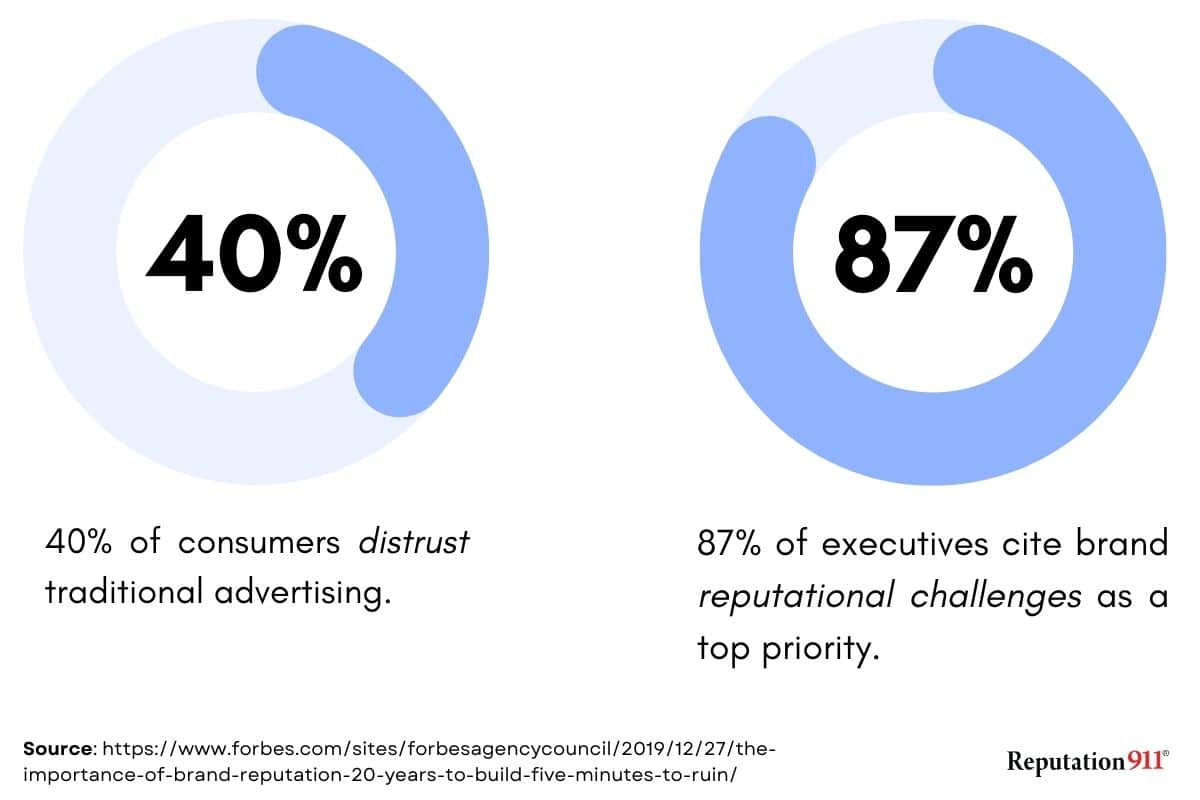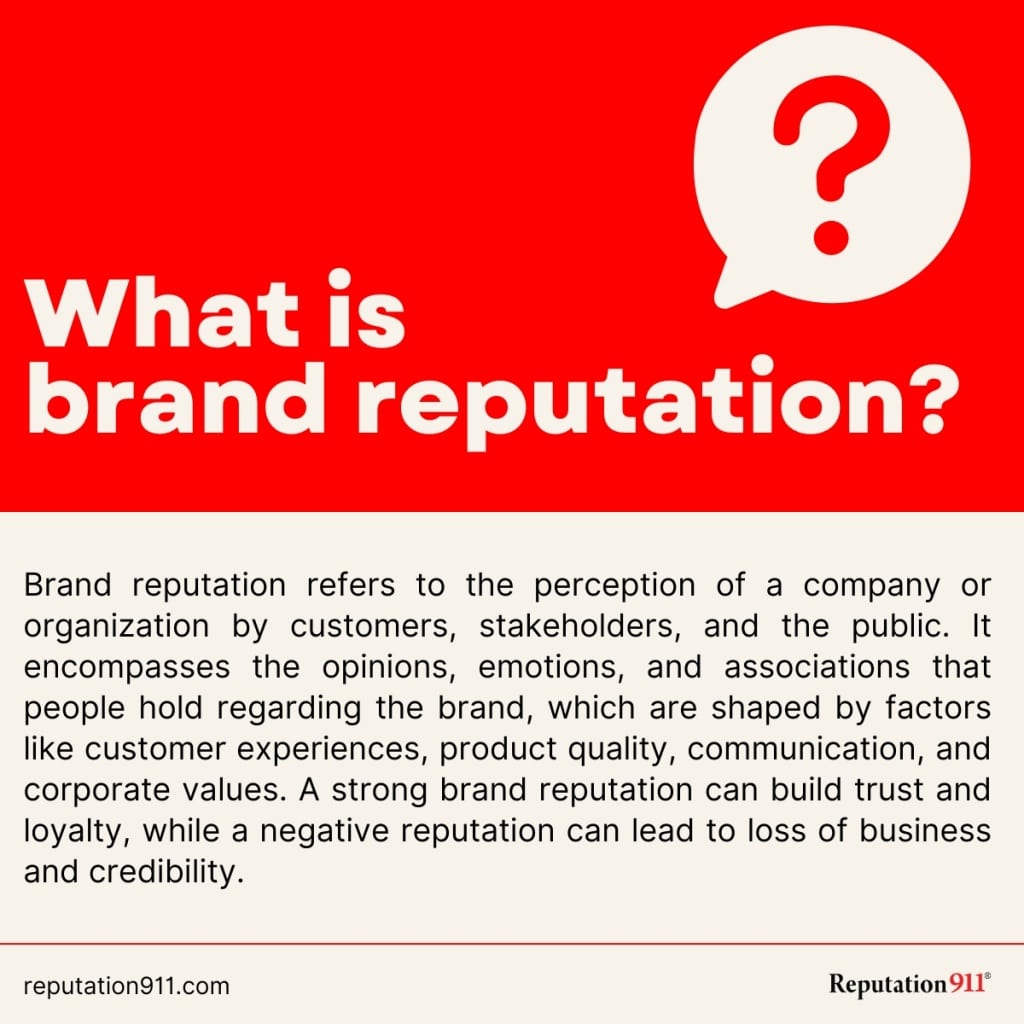Reputation threats like negative reviews, misleading news stories, and outdated content can surface when you least expect them. Proactive brand reputation management helps protect trust, credibility, and long-term success. At Reputation911, we provide strategies to address harmful content and strengthen your online presence—schedule a free consultation to take back control of your brand.
In a world where 40% of consumers distrust traditional advertising, businesses depend on social proof and credibility (Forbes). With 87% of executives naming brand reputation as a top priority, it’s clear that reputation drives long-term success. Read on to discover why it matters, the benefits it brings, and the strategies you can use to strengthen yours.

Related: Learn how to conduct a brand reputation analysis.
Brand reputation refers to the public perception of a company or organization. This includes any opinions, beliefs, and general sentiment that consumers, stakeholders, and the public have.
Each time a person interacts with a brand, they form an opinion. This includes seeing ads, reading online reviews, hearing news, interacting with customer service, etc. Every interaction, large or small, forms the reputation of your brand.
A positive image fosters trust, customer loyalty, and long-term success. But, a negative brand reputation will damage credibility, sales, and growth.
Related: Learn how to conduct a brand reputation analysis.

Related: Learn how to conduct a brand reputation analysis.
The difference between brand vs reputation is subtle, but important. Your brand is how you present your organization to the world, and is something you have control over. Your reputation, on the other hand, is how others perceive you collectively.
A brand encompasses everything an organization or person puts out into the world, including your
Some of these may change organically with time, but overall, the identity should be stable and enduring.
Reputation, however, is more finicky. You decide what your brand is, but the public decides what your reputation is. It can fluctuate over time as public opinion about you shifts.
Various factors influence your brand reputation, shaping how customers, stakeholders, and the public perceive your business. Put your attention on these key areas:

On the internet, news about brands spreads at lightning speed. This means a positive reputation is not just a “nice-to-have”, but essential to thrive in today’s market. Actively building a strong reputation can be your most significant asset, while neglecting it is your biggest risk. Here are the benefits of a strong brand reputation:
A strong reputation means your company stands out. On average, it takes about 5-7 impressions for people to even remember a brand (StatusLabs).
But, a positive first impression will get people interested, making your brand memorable and trustworthy from the start. With a solid reputation, potential customers are more likely to recall and choose your company over the competition.
A highly-regarded brand fosters trust and loyalty among consumers. But, losing that trust can spell disaster for your business.
71% of customers lose faith entirely in businesses that appear to value profits over their customers. (Edelmen Trust Barometer 2023). Meanwhile, 90% of consumers remain loyal to businesses that share their values (Status Labs).
A strong reputation helps build long-lasting relationships with customers who advocate for your business.
Consumers typically only want to buy from businesses they trust. Projecting a positive brand reputation builds that trust.
In fact, 90% of consumers will not frequent a business with a negative reputation. 87% will even reverse a purchase decision after reading negative news or reviews about business online (Status Labs).
On the other hand, businesses with a strong reputation tend to see increased conversions and customer retention.
A strong brand reputation makes it much easier to attract top talent. This means you save money on recruiting costs, with new hires eager to join and current employees reluctant to leave.
Did you know that a bad reputation costs companies at least 10% more per new hire (Harvard Business Review)? Plus, 70% of prospective employees reject offers from companies with bad reputations. This is true even for those that are unemployed at the time (StatusLabs).
On top of that, 92% of employees would leave their current job to work for another company with an excellent reputation (TestGorilla).
A well-known and respected business naturally attracts employees that align with its values. This makes it easy to hire for culture fit, which in turn strengthens the company culture. In the end, you get a positive feedback loop of motivated, productive employees.
A good brand reputation fuels organic growth through word-of-mouth marketing. This matters in a world where people distrust traditional advertising.
92% of customers trust earned media (such as recommendations from friends/family) over all other forms of advertising. Moreover, word-of-mouth is the primary factor behind 20-50% of all purchasing decisions (The Social Media Hat).
This doesn’t have to be literal word-of-mouth either. A loyal social media following is a huge social proof asset for your business. Positive engagement online builds credibility, encouraging new customers to trust your business as well.
Positive reviews, testimonials, and social media endorsements amplify your brand’s reach without added costs.
An organization that has a strong brand reputation means investors have more confidence working with you. Reputation impacts stock value. Corporate brand reputation accounts for 35.3% of the market capitalization of the world’s top 15 equity market indices.
This equates to $16.77 trillion in value for stakeholders (AMO Global Reputation Value Drivers Report). A negative reputation means investors will overlook or withdraw from your business. Organizations that nurture their reputation attract long-term investments and enjoy stable financial growth.
Having the right brand reputation management strategy is critical for businesses to thrive. These days, businesses need to have a unified online and offline presence to succeed.
How can companies and organizations improve their online reputation? Here are a few ideas to consider – think of these as your company brand reputation must-haves!
Building trust and credibility starts with integrity. You must always deliver on what you promise to your audience, whether it’s product quality, service, or customer support.
Meaning what you say is the key to maintaining a positive brand reputation.
If challenges arise, be honest about what went wrong and how you’re addressing it. This can turn the most intense challenges into an opportunity.
Your brand identity is the face of your company, so it needs to be cohesive and consistent across platforms. And, you need to communicate this to your target audience.
This means having a cohesive visual language, including your logo, colors, branding elements, imagery, etc.
A unified brand voice matters as well. Carefully craft a well-defined mission, vision, and value statement. People need to know your company’s purpose and unique selling points.
Creating a style guide keeps everything consistent across all marketing campaigns and communications.
These days, a strong online presence is non-negotiable. This means that you need:
User experience (UX) plays a major role in people’s perception. As many as 42% of users would leave a website because of poor functionality (Clutch). Make sure your platforms are intuitive, engaging, and create a positive user experience.
Increasingly, consumers flock towards brands that align with their values. Make sure to clearly communicate your brand’s mission and values in your messaging, content, and social media interactions.
Authenticity in marketing is key here. People can tell when a company is genuine versus just trying to sell them something. You need to create an emotional connection by sharing your company’s journey, goals, and contributions to society.
Consumers these days often make decisions based on how closely a brand’s values align with their own.
When these values do align, customers tend to trust a business more. In fact, 92% of consumers are more likely to trust a company who supports social or environmental issues (Forbes).
Corporate Social Responsibility (CSR) doesn’t just matter for trust, but for your bottom line as well. 66% of customers will actually pay more money to support a company committed to CSR (MarketingCharts).
63% of the public would even give socially responsible businesses the benefit of the doubt during a crisis (Prowly).
Consider causes that align both with your brand’s values and what your audience values the most. CSR initiatives should make sense with what your business is all about.
To build a strong brand reputation, your audience must be able to find you in search engines. Effective SEO means your business will appear in both non-branded and branded search results.
This means doing keyword research, optimizing web content, and focusing on local SEO if your business has a physical presence. Great SEO makes it easy for customers to find you, learn about you, and read positive reviews.
Customer service matters, but many companies miss the mark. People should know your business for its responsiveness, care, and effective problem-solving.
Consumers value businesses that prioritize their needs and go the extra mile to ensure customer satisfaction. Positive interactions build trust and repeat business, giving you a competitive advantage.
Focusing on your internal company culture is an often underestimated, but important part of your reputation. A positive working environment boosts employee satisfaction and retention, and reflects well on your company.
These days, employee review sites like Glassdoor can either make or break your image. Potential candidates and even consumers care how you treat employees. Happy staff members become advocates, spreading positive word-of-mouth on and offline.
Encouraging reviews from both customers and employees helps you build credibility. Online reviews act as social proof, which can influence consumer decisions.
Proactively ask satisfied customers to share their experiences, and make it easy for them to leave reviews.
An influx of positive reviews can even drown out bad ones. Check out our online review management guide to learn more.
Customer feedback and criticism is a valuable tool that you can use to improve your company and image.
Use tools like Google Alerts, social media listening, and reputation monitoring tools to track mentions in real time.
Whether feedback is positive or negative, act on it. This shows you actually value their opinions and want to offer the best service possible.
Working with a crisis PR team helps you shape your brand’s image in the media and public eye.
A good PR team will help you:
Proactive PR efforts help you stay ahead of any potential reputation risks, while promoting your successes.
In addition to PR, you’ll likely also need online reputation management services geared towards helpnig you navigate a crisis. Learn more about reputation crisis management.
Confused about the differences between PR and reputation management? Check out our handy guide here: PR vs Reputation Management.
Your company’s brand isn’t the only one that matters. Personal branding is critical for executives, company leaders, rising influencers, and even working professionals.
As an industry leader, your personal brand can influence the success of your company. Just like the company itself, your image shapes how investors, clients, and potential partners view the business.
Don’t wait for public backlash to take action. Use these strategies to build and promote your brand’s reputation for the long-term.
Reputation damage can happen when you least expect it, but you can start taking preventative steps today.
The team at Reputation911 can help your brand get back on the path to success. We address negative or false reviews, news stories, articles, and other forms of content that can damage your reputation. Schedule a free consultation with us and learn more about how we can help you.